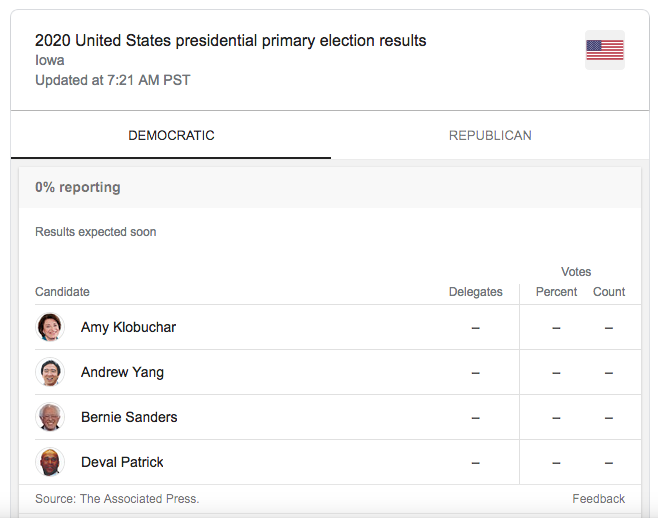By Jim Ellis
Feb. 4, 2020 — The reporting problem that arose in the Iowa Democratic Caucuses last night have left us with no results for what could be as long as a full day or more after votes were cast, but it still appears as if a clear winner and loser have emerged. The winner and loser terms have a different meaning in the Iowa Caucus context, however.
Voters attended meetings in 1,679 precincts and the party organizers were supposed to submit their first ballot and final alignment numbers through a specially designed application. The app failed, and so did the party’s back-up plan. Therefore, while voting occurred in all of the precincts, less than one-third of the totals have been received at the Iowa Democratic Party headquarters at the end of the night. The party spokespeople say they will not release any numbers until the entire state reports, and the 1st and 2nd round totals have been verified.
Meeting attenders cast their first ballot and the candidates failing to attain 15 percent support in the precinct were eliminated. In the final alignment round, those voting for a non-qualifying candidate were then lobbied to vote for a candidate who did surpass the 15 percent threshold and would thus qualify for delegates to advance to the state convention on June 13. The state delegates will then vote to assign Iowa’s 41 first-ballot delegates to the Democratic National Convention, but the eventual official apportionment will closely follow the Caucus votes.
What we began seeing from the fastest reporting precincts that were released, and that was less than two percent of the statewide vote, was a bunching at the top among Sens. Bernie Sanders (I-VT) and Elizabeth Warren (D-MA), and South Bend Mayor Pete Buttigieg. Former Vice President Joe Biden and Sen. Amy Klobuchar (D-MN) were in need of further support from around the state to reach the 15 percent mark, but both are close. Therefore, it does appear possible that all five of these contenders could qualify for a share of the state’s delegates.
The unfolding situation seems to favor one person in particular, while disfavoring another. On the short end is Sen. Sanders, even though he looks to clinch first place. The glitch cost him the opportunity to declare outright victory in a timely fashion before a national television audience. The most fortunate candidate looks to be Biden, whose early performance suggests he might not even qualify for delegates in a substantial number of precincts. The reporting problem prevented headline stories claiming that he was Iowa’s under-performer.
We can now expect to see several occurrences. First, the Iowa results have been compromised and neutralized. Because it appears as many as five candidates will qualify for delegates, and with the four individuals not placing first at the end of the counting undoubtedly saying the results are tainted or virtually meaningless, we will see no definitive first-place finisher here.
Second, there are now six viable candidates beginning the stretch drive for the nomination. In addition to the top five Iowa participants, former New York City mayor, Michael Bloomberg, is also clearly on the political horizon.
Third, the final Iowa results, when they are actually released, will now be lost in the media shuffle because of other major events and since they are already being discounted. Tonight, President Trump gives the State of the Union Address. Tomorrow, the vote to remove him from office occurs in the Senate. By Thursday, the Iowa story will be in the rear-view mirror as all attention will turn to New Hampshire with the understanding that we are seeing a legitimate early multi-candidate race in which a half-dozen individuals have the opportunity to win.
To say the Iowa result, after more than a year of campaigning for these candidates, is anti-climactic is certainly an under-statement. Still, virtually all the active candidates have lived to see another political day. The New Hampshire primary is one week from today, on Feb. 11. Results there are expected to be reported the night of vote.

